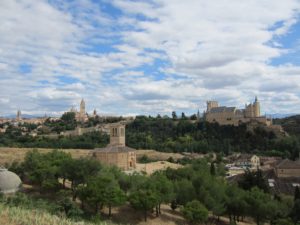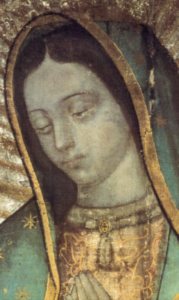 December 12, Feast of Our Lady of Guadalupe
December 12, Feast of Our Lady of Guadalupe
A note from the United States Conference of Bishops: “As Christmas approaches and especially on this feast of Our Lady, we are reminded of how our savior Jesus Christ was not born in the comfort of his own home, but rather in an unfamiliar manger,” said Cardinal Daniel DiNardo, archbishop of Galveston-Houston and president of the United States Conference of Catholic Bishops (USCCB). “To all those families separated and far from home in uncertain times, we join with you in a prayer for comfort and joy this Advent season,” Cardinal DiNardo added.
———————————————————-
Saint John of the Cross wants us to live life abundantly; clearly, everything he teaches is about living abundantly. But in order for us to be able to do that, our desires need to be disciplined.
The spiritual journey is about cultivating the delicacy of love. That term, the delicacy of love is the overarching template; that is the perspective, the lens through which we are to understand the nada. The delicacy of love is disciplined by the education of the desire.
The expression, the education of desire, comes from the author, Livio Melina, who writes about Thomistic theology. Desire is educated by a proper awareness and understanding of what is most valuable.
What makes life most worth living? We have to have the goal ever in mind. The awareness and understanding of what is most valuable is your vision. We have to have the right vision, the ability to see reality, the vision to see what is most true, good, and beautiful.
This ability to see must precede our capacity to be. I have to see it before I can become it. This applies on a natural level to anyone who is seeking excellence, whether it’s sports, politics, science, or spirituality. This principle applies in all of the arts. You have to have your vision before you can pursue the goal, to become your true selves as intended by God. That vision leads to a mission, and our mission sets us in motion.
We become the person we are created, predestined and graced to be by our choices. Our choices make the difference in our character, and our character is what prepares the way for our destiny.
Thomas Merton had a really great understanding of Saint John of the Cross. He wrote The Ascent of Truth, the book about Saint John quite early on in his life as a monk and writer. It’s very dense, the style is very difficult, and it’s a challenging book to read, not as enjoyable reading Iain Matthew’s The Impact of God. However, toward the end of his life, even Thomas Merton admits to not liking The Ascent of Truth because it was all book knowledge rather than from the heart, from experiential wisdom. In fact, he had a distaste for it. But Merton had a great understanding of Saint John of the Cross and we see that in his Introduction to the Sayings of Light and Love and the Precautions found in the “Light and Darkness” and in the “Disputed Questions.”
Merton writes, “Saint John’s whole asceticism is basically a question of choice and preference.” That helps us to understand how to practically live out the nada he tells us about and asks us to follow. Our choices must be based upon a right understanding, a proper vision of what Thomas Merton calls, a hierarchy of value.
In Romans 12: 1-2, Saint Paul writes, “I beg of you by the mercies of God to offer your lives as a living oblation, acceptable to God, your spiritual worship. Do not be conformed to this age, but be transformed by the renewal of your mind that you may know what is God’s will, what is good, pleasing and perfect.” There’s a hierarchy of value of there. Freedom is broad. We have a lot of things to choose from. God wants us to enjoy life; He’s given us everything at our disposal. We’re the crown of His creation, made in His image and freedom is broad.
Clearly, He puts limits on freedom in regards to what is immoral, but in regards to what is neutral, He has given us plenty at our disposal to let us enjoy and to give Him glory because He loves us. And among those things He puts at our disposal there’s a hierarchy of value between what is good, pleasing, and perfect.
Some things are acceptable, but other things are better and more perfect. Seeking perfection is about not being settled about being good enough! That is a huge part of seeking perfection. Don’t be comfortable with just being good enough! Seek the greatness of who God is for you and what He wants to be in you (to be continued).
Copyright 2016, Fr. Robert Barcelos. All Rights Reserved
Novena Prayer to St. John of the Cross
Lord, you endowed our Father, St. John of the Cross with a spirit of self-denial and a love of the cross. By following his example may we come to the eternal vision of your glory. Through his intercession, may we obtain the favor we ask for (pause for intention) if it be for our good and the greater glory of God. We ask this through Christ our Lord. Amen.
The Litany of Humility
O Jesus! meek and humble of heart, Hear me.
From the desire of being esteemed, Deliver me, Jesus.
From the desire of being loved…
From the desire of being extolled …
From the desire of being honored …
From the desire of being praised …
From the desire of being preferred to others…
From the desire of being consulted …
From the desire of being approved …
From the fear of being humiliated …
From the fear of being despised…
From the fear of suffering rebukes …
From the fear of being calumniated …
From the fear of being forgotten …
From the fear of being ridiculed …
From the fear of being wronged …
From the fear of being suspected …
That others may be loved more than I, Jesus, grant me the grace to desire it.
That others may be esteemed more than I …
That, in the opinion of the world,
others may increase and I may decrease …
That others may be chosen and I set aside …
That others may be praised and I unnoticed …
That others may be preferred to me in everything…
That others may become holier than I, provided that I may become as holy as I should…



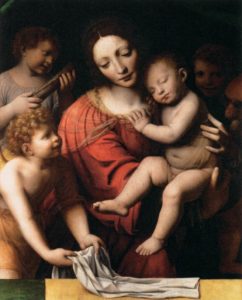

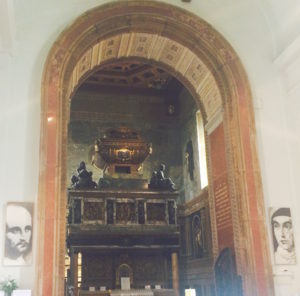
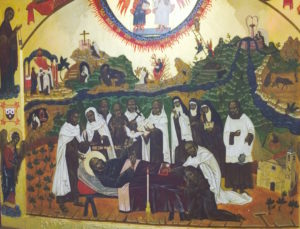
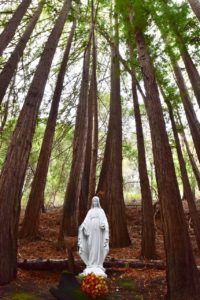
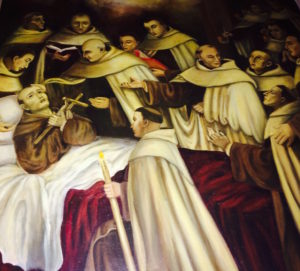

 December 12, Feast of Our Lady of Guadalupe
December 12, Feast of Our Lady of Guadalupe 